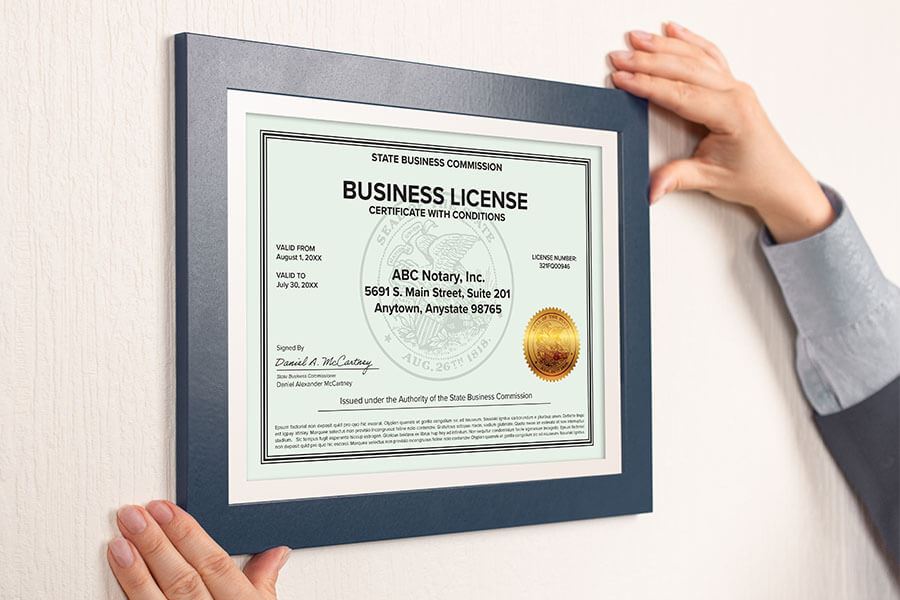
Updated 3-18-24. Starting your new Notary business may seem as free and easy as hanging a shingle, but Notary businesses, like many others, may require certain licenses and requirements, including a business license. Depending on where you live, that shingle may represent advertising at home, and there’s a license for that.
If you’re randomly notarizing documents for free here and there, you don’t need to worry about obtaining a business license because you’re not running a business. That’s easy. Figuring out who is required to get one is a much tougher question, but it boils down to where the Notary lives.
Some jurisdictions, including cities, counties and states, don’t require you to get a license at all; some look at gross receipts; others look at whether you’re doing business at home and earning anything; while some jurisdictions want you to register and pay a fee no matter what you do.
You’ll want to contact your local, county and state authorities to determine what licenses and permits you need, fees you must pay, and agencies with which you must register.
According to the U.S. Chamber of Commerce, “Even veteran entrepreneurs are often unsure about which city, county, state and federal agencies they have to contact before opening day. And getting this process right is really important — one missed regulation can be a huge setback (or fine) for your business.” The chamber also suggests that you may want to talk to a lawyer, accountant or another expert unless you’re also an expert in the field of business regulations (which is unlikely).
Here are some business license basics, including how to get started and which types of local agencies to consult, plus some resources for further exploration if you’re not yet a Notary but are considering starting a business.
Business license basics
Getting started is the hardest part. If you’re researching the issue yourself, you can start with the city in which your business is located and then move on to research county and state rules. According to the Small Business Administration, a business owner such as a Notary wouldn’t need any federal permits unless they’re also selling something regulated at the federal level, such as alcohol or firearms, an interesting, albeit unlikely, combination.
Laura Biewer, a Notary entrepreneur who runs At Your Service Mobile Notary out of Modesto, California, said she has a business license from her city that allows her to run a business from her home address that costs about $75 a year. She also must file a simple city tax return that runs about .002 percent of gross revenue. In addition, she has a business license for her DBA, (Doing Business As) “At Your Service, Mobile Notary,” which was filed with the county clerk.
“If Notaries are only haphazardly notarizing docs here and there it is not a business, so no permit needed, but if advertising themselves to get business they should consider complying with their city and county requirements,” she said.
According to the City of Modesto’s website, a license is required for all home and commercial businesses within the city. A business physically located outside the city limits performing a service inside the city also must have a license.
Of course, these rules apply to just one corner of the country — every jurisdiction’s rules vary. Houston, Texas, for example, does not require a license, said mobile Notary Tracee Jordan.
Jordan immediately filed her business name as a DBA when she started out, but after significant research, she decided she needed to incorporate it in order to take her business to the next level.
At that point, she sought legal counsel, and she and her attorney agreed on forming an LLC, or Limited Liability Corporation, which separates her personal assets from her company’s assets in case she is ever sued. Different types of corporations have different benefits, costs and tax implications, she said.
Regulations can become much more complicated if the Notary has employees — some jurisdictions require additional liability insurance, payroll taxes, and more, but if the Notary is running a sole proprietorship, they wouldn’t have to worry about rules for companies with employees.
Where can I get help?
If all this seems a little overwhelming, or you can’t afford an attorney, there’s free help. The U.S. Small Business Administration provides significant resources to people starting businesses through SCORE (Service Corps of Retired Executives), a resource partner. SCORE offers referrals to experienced local mentors who can help guide Notaries through regulatory red tape.
The organization also offers helpful templates, including business plan templates; webinars on everything from compliance to marketing; and access to subject matter experts beyond your specific industry — for example, Notaries can find access to people with advertising or legal expertise.
Local government resources are also available; for example, if you’re a Notary in California, the Governor’s Office of Business and Economic Development is a great place to check out different requirements.
Jordan recommends Notaries look for a mentor who knows the local rules. It’s really tough to find a Notary willing to mentor (Jordan called it the “needle in the haystack”), but if you have the time and patience to look, the results are worth it. Discussing business regulations should be an important topic for the two of you to discuss.
Some Notaries take a haphazard approach to compliance, or don’t really understand how to professionalize a business, she noted. Mastering regulatory requirements and determining the correct corporate structure for your needs are just a few examples of how to work on, rather than just in, your business.
Related Articles:
Building a Notary business: It pays to have a plan
4 steps to starting a successful Notary business
Additional Resources:
Notary Signing Agent Resources